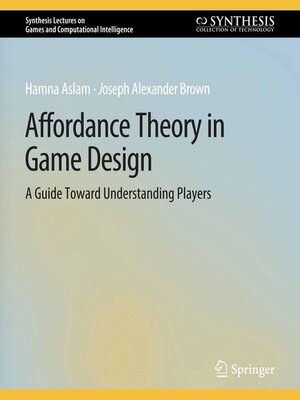Affordance Theory in Game Design
ebook ∣ A Guide Toward Understanding Players · Synthesis Lectures on Games and Computational Intelligence
By Hamna Aslam

Sign up to save your library
With an OverDrive account, you can save your favorite libraries for at-a-glance information about availability. Find out more about OverDrive accounts.
Find this title in Libby, the library reading app by OverDrive.



Search for a digital library with this title
Title found at these libraries:
| Library Name | Distance |
|---|---|
| Loading... |
Games, whether educational or recreational, are meant to be fun. How do we ensure that the game delivers its intent?
The answer to this question is playtesting. However, a haphazard playtest process cannot discover play experience from various dimensions. Players' perceptions, affordances, age, gender, culture, and many more human factors influence play experience. A playtest requires an intensive experimental process and scientific protocols to ensure that the outcomes seen are reliable for the designer.
Playtesting and players' affordances are the focus of this book. This book is not just about the playtest procedures but also demonstrates how they lead to the conclusions obtained when considering data sets. The playtest process or playtest stories differ according to the hypothesis under investigation. We cover examples of playtesting to identify the impact of human factors, such as age and gender, to examine a player's preferences for game objects' design and colors. The book details topics to reflect on possible emotional outcomes of the player at the early stages of game design as well as the methodology for presenting questions to players in such a way as to elicit authentic feedback.
This book is intended mainly for game designers, researchers, and developers. However, it provides a general understanding of affordances and human factors that can be informative for readers working in any domain.







